The Role of Foreign Aid in Pierre Trudeau's Foreign Policy (1968-1984)
VerifiedAdded on 2023/01/13
|13
|4256
|23
Essay
AI Summary
This essay delves into the foreign aid policy of Canadian Prime Minister Pierre Trudeau, focusing on his tenure from 1968 to 1984. It explores Canada's role in supporting the development of Third World nations, tracing the historical and theoretical background of Trudeau's approach, including the influence of the Cold War and initiatives like the Colombo Plan. The essay analyzes Trudeau's expansion of foreign aid programs, particularly his focus on Latin America, and examines the humanitarian aspects of his policy, contrasting it with the militaristic approaches of other nations. It also discusses the legacy of Trudeau's policies and their impact on Canada's international standing, highlighting the shift towards increased spending on humanitarian aid and the importance of upholding human rights. The essay concludes by emphasizing Trudeau's unique blend of liberal values and authoritarian tendencies in implementing his foreign aid agenda, setting a benchmark for subsequent leaders.
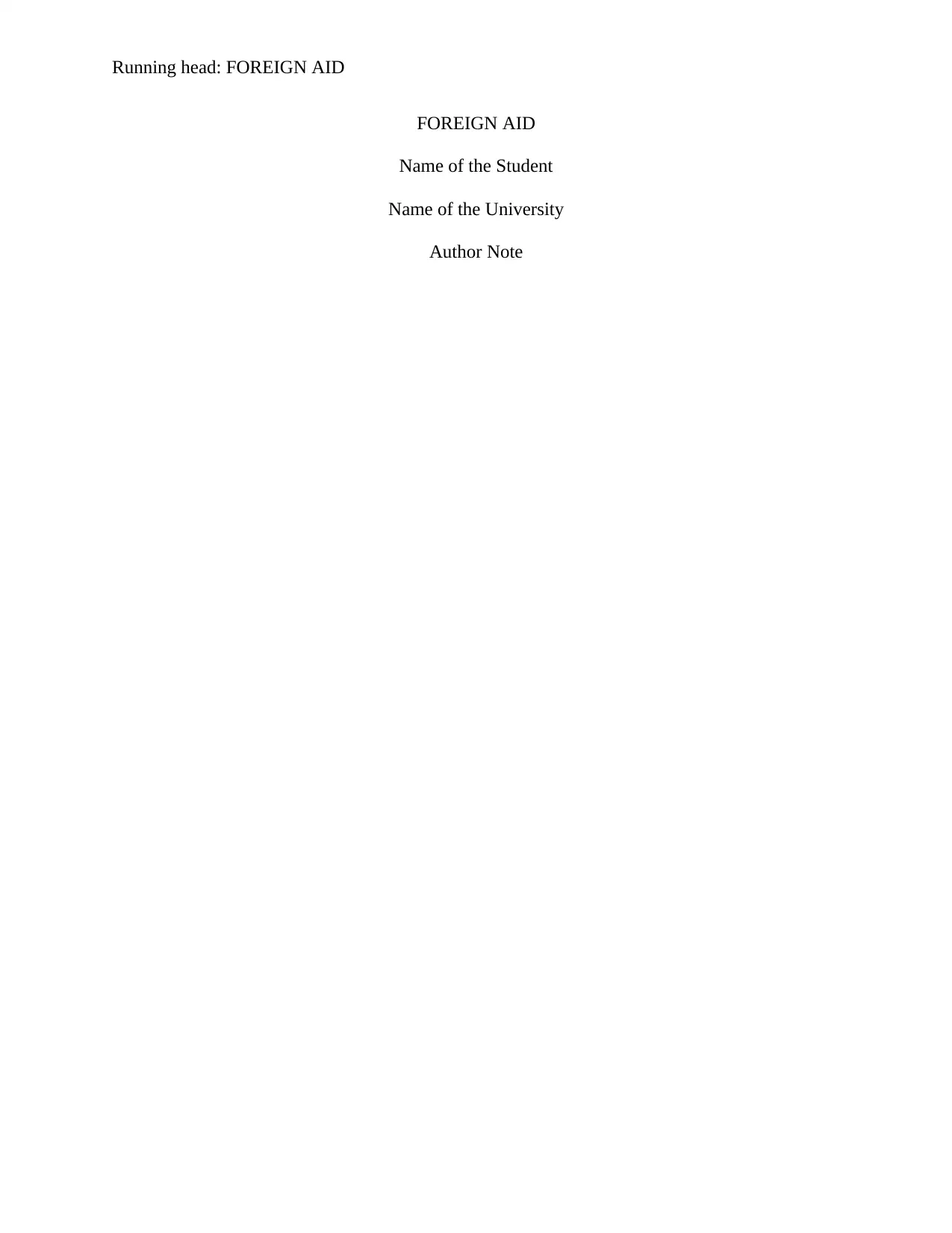
Running head: FOREIGN AID
FOREIGN AID
Name of the Student
Name of the University
Author Note
FOREIGN AID
Name of the Student
Name of the University
Author Note
Paraphrase This Document
Need a fresh take? Get an instant paraphrase of this document with our AI Paraphraser
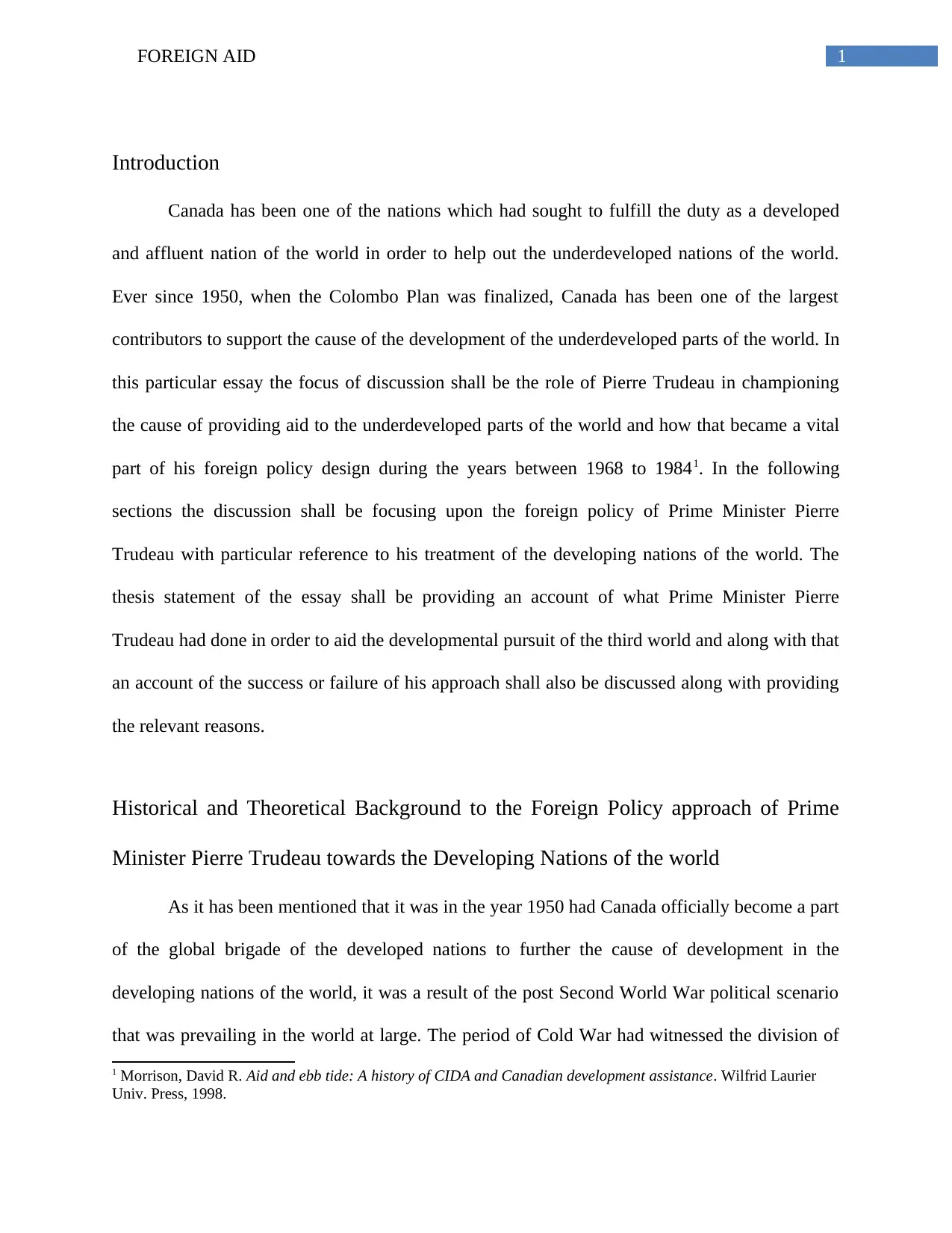
1FOREIGN AID
Introduction
Canada has been one of the nations which had sought to fulfill the duty as a developed
and affluent nation of the world in order to help out the underdeveloped nations of the world.
Ever since 1950, when the Colombo Plan was finalized, Canada has been one of the largest
contributors to support the cause of the development of the underdeveloped parts of the world. In
this particular essay the focus of discussion shall be the role of Pierre Trudeau in championing
the cause of providing aid to the underdeveloped parts of the world and how that became a vital
part of his foreign policy design during the years between 1968 to 19841. In the following
sections the discussion shall be focusing upon the foreign policy of Prime Minister Pierre
Trudeau with particular reference to his treatment of the developing nations of the world. The
thesis statement of the essay shall be providing an account of what Prime Minister Pierre
Trudeau had done in order to aid the developmental pursuit of the third world and along with that
an account of the success or failure of his approach shall also be discussed along with providing
the relevant reasons.
Historical and Theoretical Background to the Foreign Policy approach of Prime
Minister Pierre Trudeau towards the Developing Nations of the world
As it has been mentioned that it was in the year 1950 had Canada officially become a part
of the global brigade of the developed nations to further the cause of development in the
developing nations of the world, it was a result of the post Second World War political scenario
that was prevailing in the world at large. The period of Cold War had witnessed the division of
1 Morrison, David R. Aid and ebb tide: A history of CIDA and Canadian development assistance. Wilfrid Laurier
Univ. Press, 1998.
Introduction
Canada has been one of the nations which had sought to fulfill the duty as a developed
and affluent nation of the world in order to help out the underdeveloped nations of the world.
Ever since 1950, when the Colombo Plan was finalized, Canada has been one of the largest
contributors to support the cause of the development of the underdeveloped parts of the world. In
this particular essay the focus of discussion shall be the role of Pierre Trudeau in championing
the cause of providing aid to the underdeveloped parts of the world and how that became a vital
part of his foreign policy design during the years between 1968 to 19841. In the following
sections the discussion shall be focusing upon the foreign policy of Prime Minister Pierre
Trudeau with particular reference to his treatment of the developing nations of the world. The
thesis statement of the essay shall be providing an account of what Prime Minister Pierre
Trudeau had done in order to aid the developmental pursuit of the third world and along with that
an account of the success or failure of his approach shall also be discussed along with providing
the relevant reasons.
Historical and Theoretical Background to the Foreign Policy approach of Prime
Minister Pierre Trudeau towards the Developing Nations of the world
As it has been mentioned that it was in the year 1950 had Canada officially become a part
of the global brigade of the developed nations to further the cause of development in the
developing nations of the world, it was a result of the post Second World War political scenario
that was prevailing in the world at large. The period of Cold War had witnessed the division of
1 Morrison, David R. Aid and ebb tide: A history of CIDA and Canadian development assistance. Wilfrid Laurier
Univ. Press, 1998.
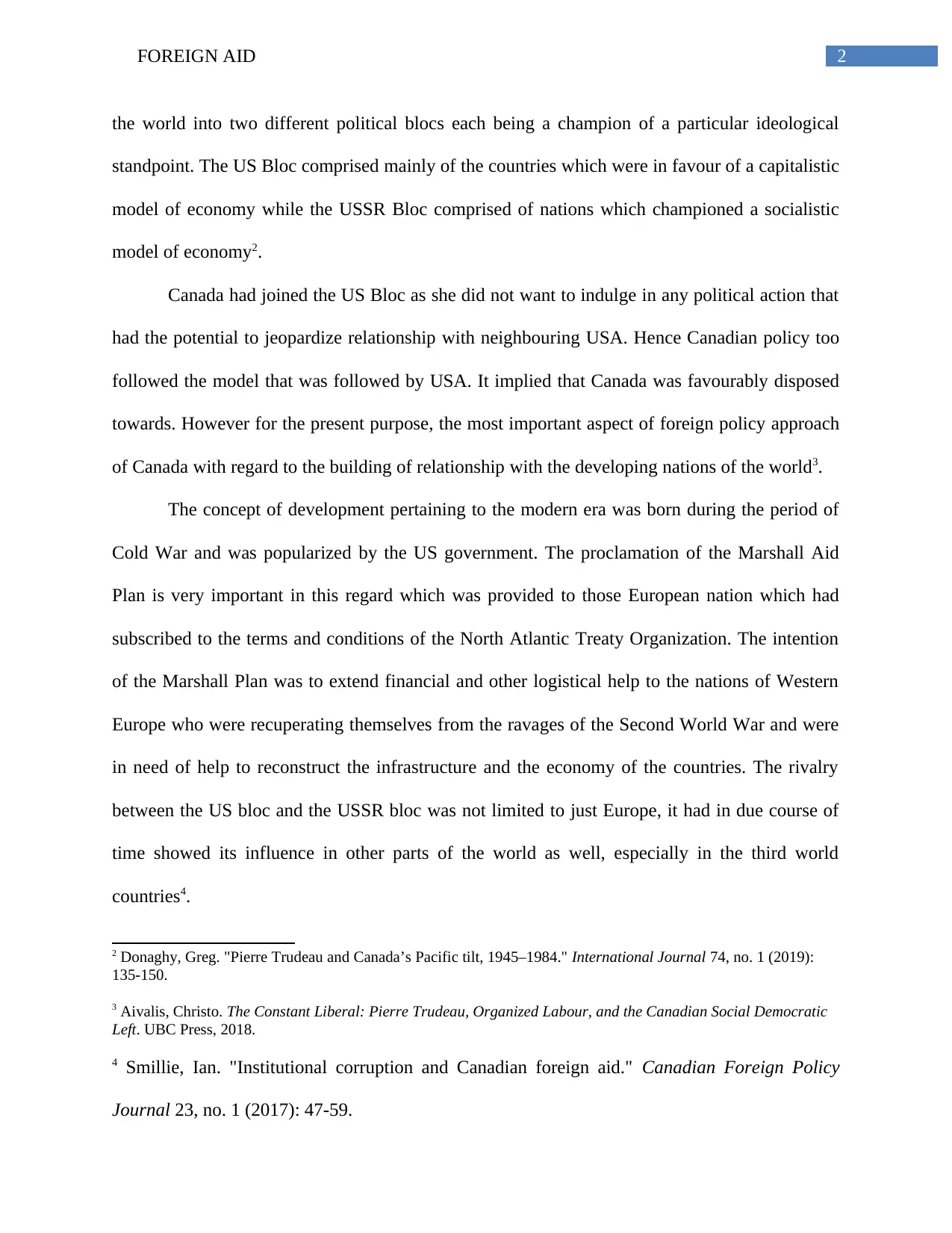
2FOREIGN AID
the world into two different political blocs each being a champion of a particular ideological
standpoint. The US Bloc comprised mainly of the countries which were in favour of a capitalistic
model of economy while the USSR Bloc comprised of nations which championed a socialistic
model of economy2.
Canada had joined the US Bloc as she did not want to indulge in any political action that
had the potential to jeopardize relationship with neighbouring USA. Hence Canadian policy too
followed the model that was followed by USA. It implied that Canada was favourably disposed
towards. However for the present purpose, the most important aspect of foreign policy approach
of Canada with regard to the building of relationship with the developing nations of the world3.
The concept of development pertaining to the modern era was born during the period of
Cold War and was popularized by the US government. The proclamation of the Marshall Aid
Plan is very important in this regard which was provided to those European nation which had
subscribed to the terms and conditions of the North Atlantic Treaty Organization. The intention
of the Marshall Plan was to extend financial and other logistical help to the nations of Western
Europe who were recuperating themselves from the ravages of the Second World War and were
in need of help to reconstruct the infrastructure and the economy of the countries. The rivalry
between the US bloc and the USSR bloc was not limited to just Europe, it had in due course of
time showed its influence in other parts of the world as well, especially in the third world
countries4.
2 Donaghy, Greg. "Pierre Trudeau and Canada’s Pacific tilt, 1945–1984." International Journal 74, no. 1 (2019):
135-150.
3 Aivalis, Christo. The Constant Liberal: Pierre Trudeau, Organized Labour, and the Canadian Social Democratic
Left. UBC Press, 2018.
4 Smillie, Ian. "Institutional corruption and Canadian foreign aid." Canadian Foreign Policy
Journal 23, no. 1 (2017): 47-59.
the world into two different political blocs each being a champion of a particular ideological
standpoint. The US Bloc comprised mainly of the countries which were in favour of a capitalistic
model of economy while the USSR Bloc comprised of nations which championed a socialistic
model of economy2.
Canada had joined the US Bloc as she did not want to indulge in any political action that
had the potential to jeopardize relationship with neighbouring USA. Hence Canadian policy too
followed the model that was followed by USA. It implied that Canada was favourably disposed
towards. However for the present purpose, the most important aspect of foreign policy approach
of Canada with regard to the building of relationship with the developing nations of the world3.
The concept of development pertaining to the modern era was born during the period of
Cold War and was popularized by the US government. The proclamation of the Marshall Aid
Plan is very important in this regard which was provided to those European nation which had
subscribed to the terms and conditions of the North Atlantic Treaty Organization. The intention
of the Marshall Plan was to extend financial and other logistical help to the nations of Western
Europe who were recuperating themselves from the ravages of the Second World War and were
in need of help to reconstruct the infrastructure and the economy of the countries. The rivalry
between the US bloc and the USSR bloc was not limited to just Europe, it had in due course of
time showed its influence in other parts of the world as well, especially in the third world
countries4.
2 Donaghy, Greg. "Pierre Trudeau and Canada’s Pacific tilt, 1945–1984." International Journal 74, no. 1 (2019):
135-150.
3 Aivalis, Christo. The Constant Liberal: Pierre Trudeau, Organized Labour, and the Canadian Social Democratic
Left. UBC Press, 2018.
4 Smillie, Ian. "Institutional corruption and Canadian foreign aid." Canadian Foreign Policy
Journal 23, no. 1 (2017): 47-59.
⊘ This is a preview!⊘
Do you want full access?
Subscribe today to unlock all pages.

Trusted by 1+ million students worldwide
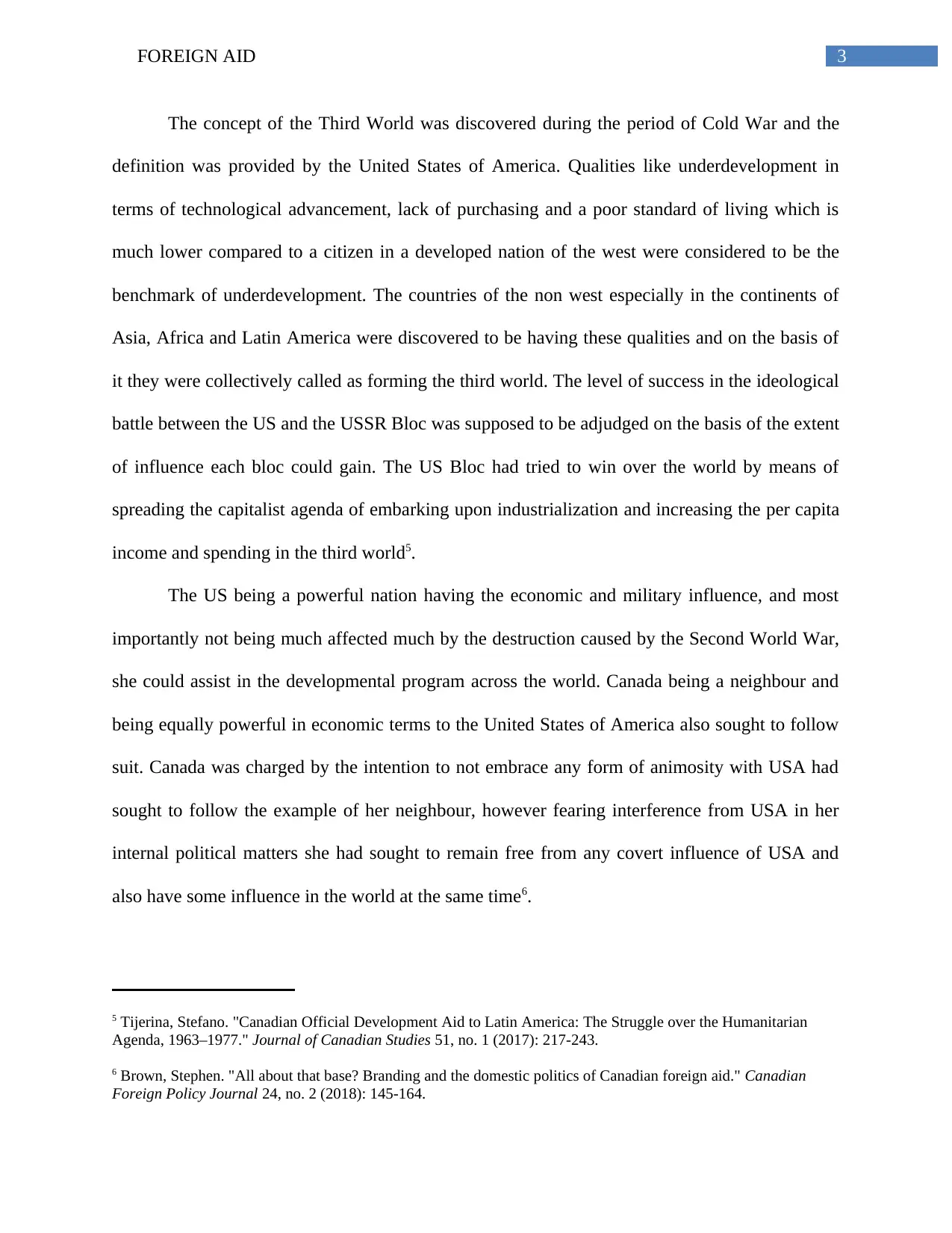
3FOREIGN AID
The concept of the Third World was discovered during the period of Cold War and the
definition was provided by the United States of America. Qualities like underdevelopment in
terms of technological advancement, lack of purchasing and a poor standard of living which is
much lower compared to a citizen in a developed nation of the west were considered to be the
benchmark of underdevelopment. The countries of the non west especially in the continents of
Asia, Africa and Latin America were discovered to be having these qualities and on the basis of
it they were collectively called as forming the third world. The level of success in the ideological
battle between the US and the USSR Bloc was supposed to be adjudged on the basis of the extent
of influence each bloc could gain. The US Bloc had tried to win over the world by means of
spreading the capitalist agenda of embarking upon industrialization and increasing the per capita
income and spending in the third world5.
The US being a powerful nation having the economic and military influence, and most
importantly not being much affected much by the destruction caused by the Second World War,
she could assist in the developmental program across the world. Canada being a neighbour and
being equally powerful in economic terms to the United States of America also sought to follow
suit. Canada was charged by the intention to not embrace any form of animosity with USA had
sought to follow the example of her neighbour, however fearing interference from USA in her
internal political matters she had sought to remain free from any covert influence of USA and
also have some influence in the world at the same time6.
5 Tijerina, Stefano. "Canadian Official Development Aid to Latin America: The Struggle over the Humanitarian
Agenda, 1963–1977." Journal of Canadian Studies 51, no. 1 (2017): 217-243.
6 Brown, Stephen. "All about that base? Branding and the domestic politics of Canadian foreign aid." Canadian
Foreign Policy Journal 24, no. 2 (2018): 145-164.
The concept of the Third World was discovered during the period of Cold War and the
definition was provided by the United States of America. Qualities like underdevelopment in
terms of technological advancement, lack of purchasing and a poor standard of living which is
much lower compared to a citizen in a developed nation of the west were considered to be the
benchmark of underdevelopment. The countries of the non west especially in the continents of
Asia, Africa and Latin America were discovered to be having these qualities and on the basis of
it they were collectively called as forming the third world. The level of success in the ideological
battle between the US and the USSR Bloc was supposed to be adjudged on the basis of the extent
of influence each bloc could gain. The US Bloc had tried to win over the world by means of
spreading the capitalist agenda of embarking upon industrialization and increasing the per capita
income and spending in the third world5.
The US being a powerful nation having the economic and military influence, and most
importantly not being much affected much by the destruction caused by the Second World War,
she could assist in the developmental program across the world. Canada being a neighbour and
being equally powerful in economic terms to the United States of America also sought to follow
suit. Canada was charged by the intention to not embrace any form of animosity with USA had
sought to follow the example of her neighbour, however fearing interference from USA in her
internal political matters she had sought to remain free from any covert influence of USA and
also have some influence in the world at the same time6.
5 Tijerina, Stefano. "Canadian Official Development Aid to Latin America: The Struggle over the Humanitarian
Agenda, 1963–1977." Journal of Canadian Studies 51, no. 1 (2017): 217-243.
6 Brown, Stephen. "All about that base? Branding and the domestic politics of Canadian foreign aid." Canadian
Foreign Policy Journal 24, no. 2 (2018): 145-164.
Paraphrase This Document
Need a fresh take? Get an instant paraphrase of this document with our AI Paraphraser
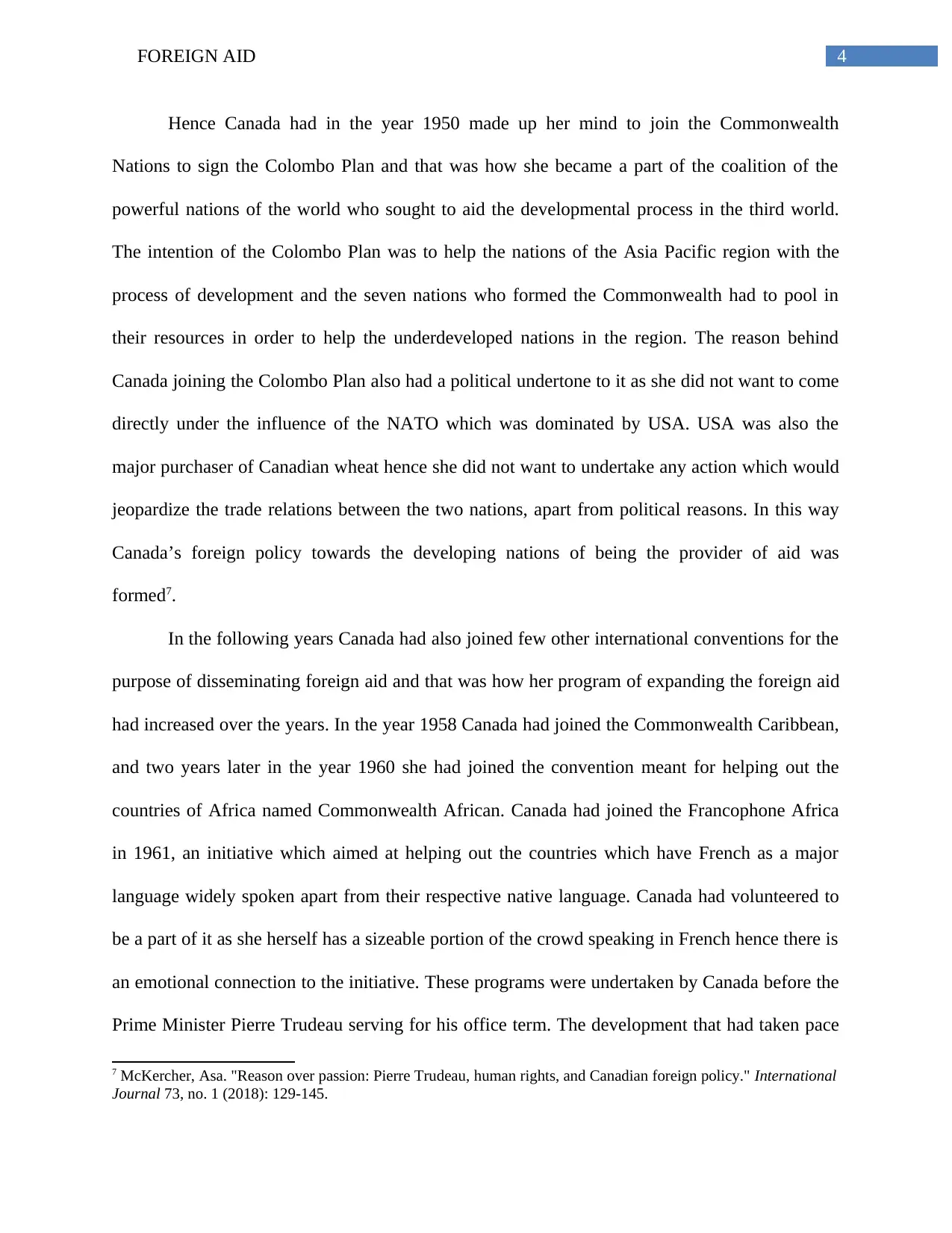
4FOREIGN AID
Hence Canada had in the year 1950 made up her mind to join the Commonwealth
Nations to sign the Colombo Plan and that was how she became a part of the coalition of the
powerful nations of the world who sought to aid the developmental process in the third world.
The intention of the Colombo Plan was to help the nations of the Asia Pacific region with the
process of development and the seven nations who formed the Commonwealth had to pool in
their resources in order to help the underdeveloped nations in the region. The reason behind
Canada joining the Colombo Plan also had a political undertone to it as she did not want to come
directly under the influence of the NATO which was dominated by USA. USA was also the
major purchaser of Canadian wheat hence she did not want to undertake any action which would
jeopardize the trade relations between the two nations, apart from political reasons. In this way
Canada’s foreign policy towards the developing nations of being the provider of aid was
formed7.
In the following years Canada had also joined few other international conventions for the
purpose of disseminating foreign aid and that was how her program of expanding the foreign aid
had increased over the years. In the year 1958 Canada had joined the Commonwealth Caribbean,
and two years later in the year 1960 she had joined the convention meant for helping out the
countries of Africa named Commonwealth African. Canada had joined the Francophone Africa
in 1961, an initiative which aimed at helping out the countries which have French as a major
language widely spoken apart from their respective native language. Canada had volunteered to
be a part of it as she herself has a sizeable portion of the crowd speaking in French hence there is
an emotional connection to the initiative. These programs were undertaken by Canada before the
Prime Minister Pierre Trudeau serving for his office term. The development that had taken pace
7 McKercher, Asa. "Reason over passion: Pierre Trudeau, human rights, and Canadian foreign policy." International
Journal 73, no. 1 (2018): 129-145.
Hence Canada had in the year 1950 made up her mind to join the Commonwealth
Nations to sign the Colombo Plan and that was how she became a part of the coalition of the
powerful nations of the world who sought to aid the developmental process in the third world.
The intention of the Colombo Plan was to help the nations of the Asia Pacific region with the
process of development and the seven nations who formed the Commonwealth had to pool in
their resources in order to help the underdeveloped nations in the region. The reason behind
Canada joining the Colombo Plan also had a political undertone to it as she did not want to come
directly under the influence of the NATO which was dominated by USA. USA was also the
major purchaser of Canadian wheat hence she did not want to undertake any action which would
jeopardize the trade relations between the two nations, apart from political reasons. In this way
Canada’s foreign policy towards the developing nations of being the provider of aid was
formed7.
In the following years Canada had also joined few other international conventions for the
purpose of disseminating foreign aid and that was how her program of expanding the foreign aid
had increased over the years. In the year 1958 Canada had joined the Commonwealth Caribbean,
and two years later in the year 1960 she had joined the convention meant for helping out the
countries of Africa named Commonwealth African. Canada had joined the Francophone Africa
in 1961, an initiative which aimed at helping out the countries which have French as a major
language widely spoken apart from their respective native language. Canada had volunteered to
be a part of it as she herself has a sizeable portion of the crowd speaking in French hence there is
an emotional connection to the initiative. These programs were undertaken by Canada before the
Prime Minister Pierre Trudeau serving for his office term. The development that had taken pace
7 McKercher, Asa. "Reason over passion: Pierre Trudeau, human rights, and Canadian foreign policy." International
Journal 73, no. 1 (2018): 129-145.
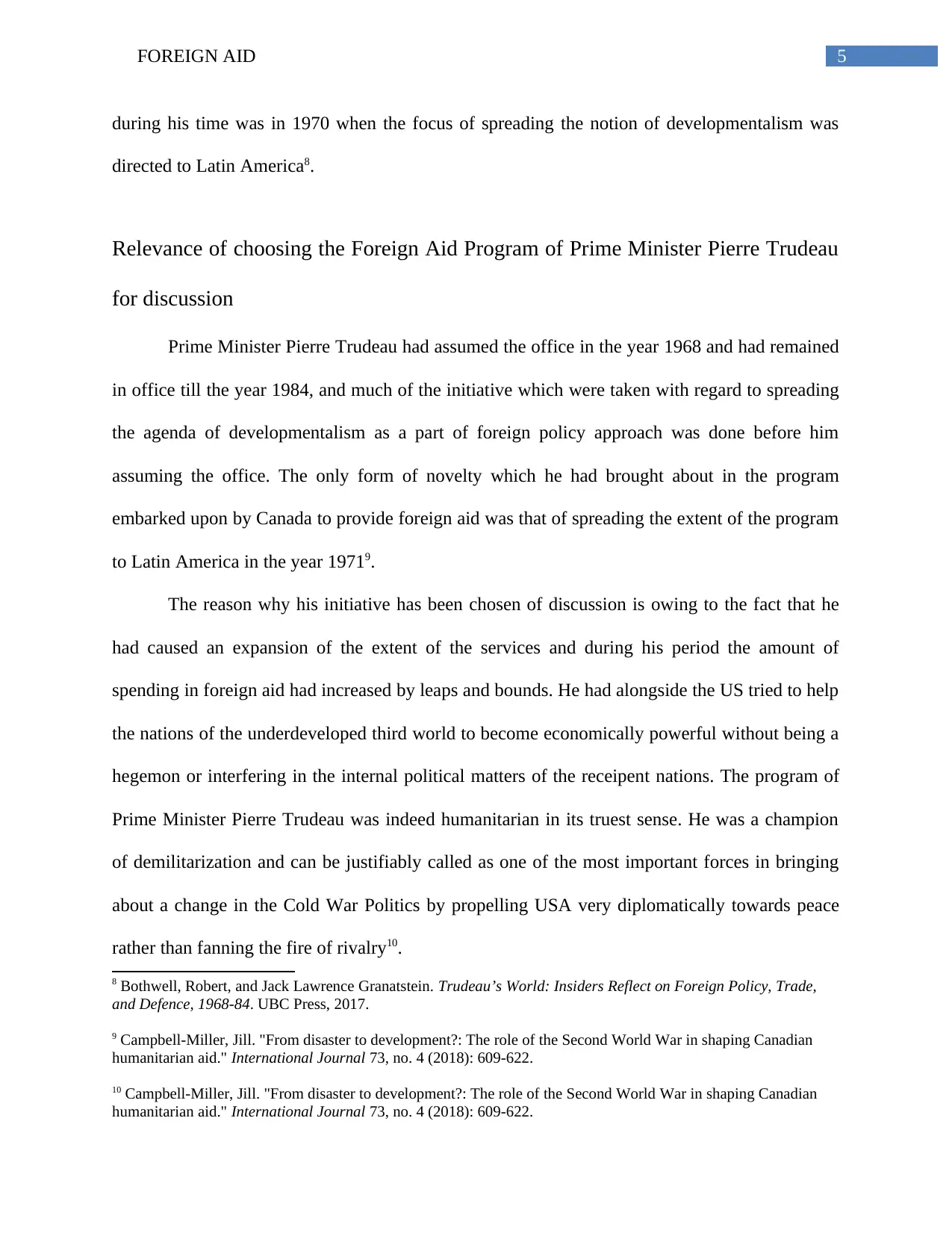
5FOREIGN AID
during his time was in 1970 when the focus of spreading the notion of developmentalism was
directed to Latin America8.
Relevance of choosing the Foreign Aid Program of Prime Minister Pierre Trudeau
for discussion
Prime Minister Pierre Trudeau had assumed the office in the year 1968 and had remained
in office till the year 1984, and much of the initiative which were taken with regard to spreading
the agenda of developmentalism as a part of foreign policy approach was done before him
assuming the office. The only form of novelty which he had brought about in the program
embarked upon by Canada to provide foreign aid was that of spreading the extent of the program
to Latin America in the year 19719.
The reason why his initiative has been chosen of discussion is owing to the fact that he
had caused an expansion of the extent of the services and during his period the amount of
spending in foreign aid had increased by leaps and bounds. He had alongside the US tried to help
the nations of the underdeveloped third world to become economically powerful without being a
hegemon or interfering in the internal political matters of the receipent nations. The program of
Prime Minister Pierre Trudeau was indeed humanitarian in its truest sense. He was a champion
of demilitarization and can be justifiably called as one of the most important forces in bringing
about a change in the Cold War Politics by propelling USA very diplomatically towards peace
rather than fanning the fire of rivalry10.
8 Bothwell, Robert, and Jack Lawrence Granatstein. Trudeau’s World: Insiders Reflect on Foreign Policy, Trade,
and Defence, 1968-84. UBC Press, 2017.
9 Campbell-Miller, Jill. "From disaster to development?: The role of the Second World War in shaping Canadian
humanitarian aid." International Journal 73, no. 4 (2018): 609-622.
10 Campbell-Miller, Jill. "From disaster to development?: The role of the Second World War in shaping Canadian
humanitarian aid." International Journal 73, no. 4 (2018): 609-622.
during his time was in 1970 when the focus of spreading the notion of developmentalism was
directed to Latin America8.
Relevance of choosing the Foreign Aid Program of Prime Minister Pierre Trudeau
for discussion
Prime Minister Pierre Trudeau had assumed the office in the year 1968 and had remained
in office till the year 1984, and much of the initiative which were taken with regard to spreading
the agenda of developmentalism as a part of foreign policy approach was done before him
assuming the office. The only form of novelty which he had brought about in the program
embarked upon by Canada to provide foreign aid was that of spreading the extent of the program
to Latin America in the year 19719.
The reason why his initiative has been chosen of discussion is owing to the fact that he
had caused an expansion of the extent of the services and during his period the amount of
spending in foreign aid had increased by leaps and bounds. He had alongside the US tried to help
the nations of the underdeveloped third world to become economically powerful without being a
hegemon or interfering in the internal political matters of the receipent nations. The program of
Prime Minister Pierre Trudeau was indeed humanitarian in its truest sense. He was a champion
of demilitarization and can be justifiably called as one of the most important forces in bringing
about a change in the Cold War Politics by propelling USA very diplomatically towards peace
rather than fanning the fire of rivalry10.
8 Bothwell, Robert, and Jack Lawrence Granatstein. Trudeau’s World: Insiders Reflect on Foreign Policy, Trade,
and Defence, 1968-84. UBC Press, 2017.
9 Campbell-Miller, Jill. "From disaster to development?: The role of the Second World War in shaping Canadian
humanitarian aid." International Journal 73, no. 4 (2018): 609-622.
10 Campbell-Miller, Jill. "From disaster to development?: The role of the Second World War in shaping Canadian
humanitarian aid." International Journal 73, no. 4 (2018): 609-622.
⊘ This is a preview!⊘
Do you want full access?
Subscribe today to unlock all pages.

Trusted by 1+ million students worldwide
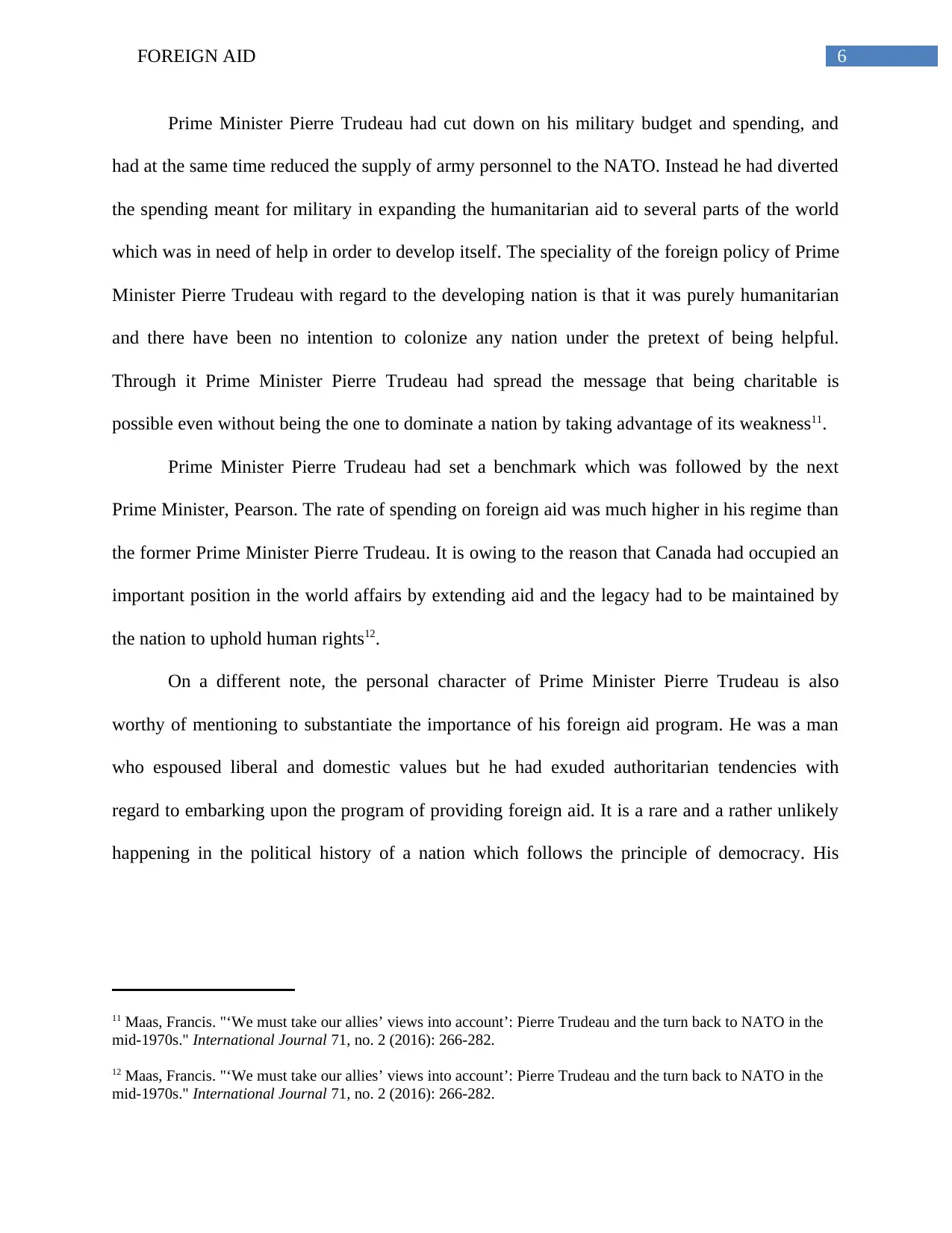
6FOREIGN AID
Prime Minister Pierre Trudeau had cut down on his military budget and spending, and
had at the same time reduced the supply of army personnel to the NATO. Instead he had diverted
the spending meant for military in expanding the humanitarian aid to several parts of the world
which was in need of help in order to develop itself. The speciality of the foreign policy of Prime
Minister Pierre Trudeau with regard to the developing nation is that it was purely humanitarian
and there have been no intention to colonize any nation under the pretext of being helpful.
Through it Prime Minister Pierre Trudeau had spread the message that being charitable is
possible even without being the one to dominate a nation by taking advantage of its weakness11.
Prime Minister Pierre Trudeau had set a benchmark which was followed by the next
Prime Minister, Pearson. The rate of spending on foreign aid was much higher in his regime than
the former Prime Minister Pierre Trudeau. It is owing to the reason that Canada had occupied an
important position in the world affairs by extending aid and the legacy had to be maintained by
the nation to uphold human rights12.
On a different note, the personal character of Prime Minister Pierre Trudeau is also
worthy of mentioning to substantiate the importance of his foreign aid program. He was a man
who espoused liberal and domestic values but he had exuded authoritarian tendencies with
regard to embarking upon the program of providing foreign aid. It is a rare and a rather unlikely
happening in the political history of a nation which follows the principle of democracy. His
11 Maas, Francis. "‘We must take our allies’ views into account’: Pierre Trudeau and the turn back to NATO in the
mid-1970s." International Journal 71, no. 2 (2016): 266-282.
12 Maas, Francis. "‘We must take our allies’ views into account’: Pierre Trudeau and the turn back to NATO in the
mid-1970s." International Journal 71, no. 2 (2016): 266-282.
Prime Minister Pierre Trudeau had cut down on his military budget and spending, and
had at the same time reduced the supply of army personnel to the NATO. Instead he had diverted
the spending meant for military in expanding the humanitarian aid to several parts of the world
which was in need of help in order to develop itself. The speciality of the foreign policy of Prime
Minister Pierre Trudeau with regard to the developing nation is that it was purely humanitarian
and there have been no intention to colonize any nation under the pretext of being helpful.
Through it Prime Minister Pierre Trudeau had spread the message that being charitable is
possible even without being the one to dominate a nation by taking advantage of its weakness11.
Prime Minister Pierre Trudeau had set a benchmark which was followed by the next
Prime Minister, Pearson. The rate of spending on foreign aid was much higher in his regime than
the former Prime Minister Pierre Trudeau. It is owing to the reason that Canada had occupied an
important position in the world affairs by extending aid and the legacy had to be maintained by
the nation to uphold human rights12.
On a different note, the personal character of Prime Minister Pierre Trudeau is also
worthy of mentioning to substantiate the importance of his foreign aid program. He was a man
who espoused liberal and domestic values but he had exuded authoritarian tendencies with
regard to embarking upon the program of providing foreign aid. It is a rare and a rather unlikely
happening in the political history of a nation which follows the principle of democracy. His
11 Maas, Francis. "‘We must take our allies’ views into account’: Pierre Trudeau and the turn back to NATO in the
mid-1970s." International Journal 71, no. 2 (2016): 266-282.
12 Maas, Francis. "‘We must take our allies’ views into account’: Pierre Trudeau and the turn back to NATO in the
mid-1970s." International Journal 71, no. 2 (2016): 266-282.
Paraphrase This Document
Need a fresh take? Get an instant paraphrase of this document with our AI Paraphraser
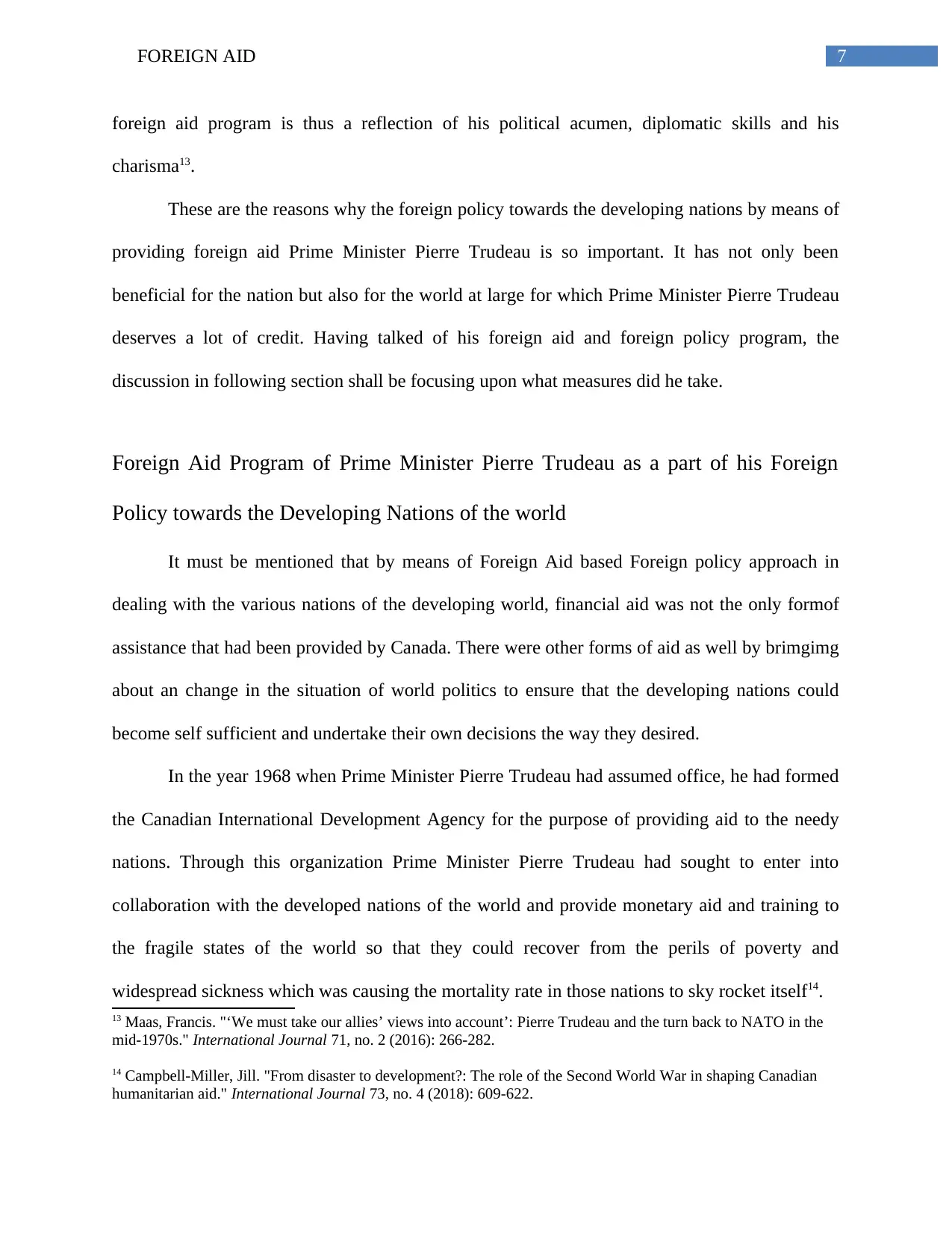
7FOREIGN AID
foreign aid program is thus a reflection of his political acumen, diplomatic skills and his
charisma13.
These are the reasons why the foreign policy towards the developing nations by means of
providing foreign aid Prime Minister Pierre Trudeau is so important. It has not only been
beneficial for the nation but also for the world at large for which Prime Minister Pierre Trudeau
deserves a lot of credit. Having talked of his foreign aid and foreign policy program, the
discussion in following section shall be focusing upon what measures did he take.
Foreign Aid Program of Prime Minister Pierre Trudeau as a part of his Foreign
Policy towards the Developing Nations of the world
It must be mentioned that by means of Foreign Aid based Foreign policy approach in
dealing with the various nations of the developing world, financial aid was not the only formof
assistance that had been provided by Canada. There were other forms of aid as well by brimgimg
about an change in the situation of world politics to ensure that the developing nations could
become self sufficient and undertake their own decisions the way they desired.
In the year 1968 when Prime Minister Pierre Trudeau had assumed office, he had formed
the Canadian International Development Agency for the purpose of providing aid to the needy
nations. Through this organization Prime Minister Pierre Trudeau had sought to enter into
collaboration with the developed nations of the world and provide monetary aid and training to
the fragile states of the world so that they could recover from the perils of poverty and
widespread sickness which was causing the mortality rate in those nations to sky rocket itself14.
13 Maas, Francis. "‘We must take our allies’ views into account’: Pierre Trudeau and the turn back to NATO in the
mid-1970s." International Journal 71, no. 2 (2016): 266-282.
14 Campbell-Miller, Jill. "From disaster to development?: The role of the Second World War in shaping Canadian
humanitarian aid." International Journal 73, no. 4 (2018): 609-622.
foreign aid program is thus a reflection of his political acumen, diplomatic skills and his
charisma13.
These are the reasons why the foreign policy towards the developing nations by means of
providing foreign aid Prime Minister Pierre Trudeau is so important. It has not only been
beneficial for the nation but also for the world at large for which Prime Minister Pierre Trudeau
deserves a lot of credit. Having talked of his foreign aid and foreign policy program, the
discussion in following section shall be focusing upon what measures did he take.
Foreign Aid Program of Prime Minister Pierre Trudeau as a part of his Foreign
Policy towards the Developing Nations of the world
It must be mentioned that by means of Foreign Aid based Foreign policy approach in
dealing with the various nations of the developing world, financial aid was not the only formof
assistance that had been provided by Canada. There were other forms of aid as well by brimgimg
about an change in the situation of world politics to ensure that the developing nations could
become self sufficient and undertake their own decisions the way they desired.
In the year 1968 when Prime Minister Pierre Trudeau had assumed office, he had formed
the Canadian International Development Agency for the purpose of providing aid to the needy
nations. Through this organization Prime Minister Pierre Trudeau had sought to enter into
collaboration with the developed nations of the world and provide monetary aid and training to
the fragile states of the world so that they could recover from the perils of poverty and
widespread sickness which was causing the mortality rate in those nations to sky rocket itself14.
13 Maas, Francis. "‘We must take our allies’ views into account’: Pierre Trudeau and the turn back to NATO in the
mid-1970s." International Journal 71, no. 2 (2016): 266-282.
14 Campbell-Miller, Jill. "From disaster to development?: The role of the Second World War in shaping Canadian
humanitarian aid." International Journal 73, no. 4 (2018): 609-622.
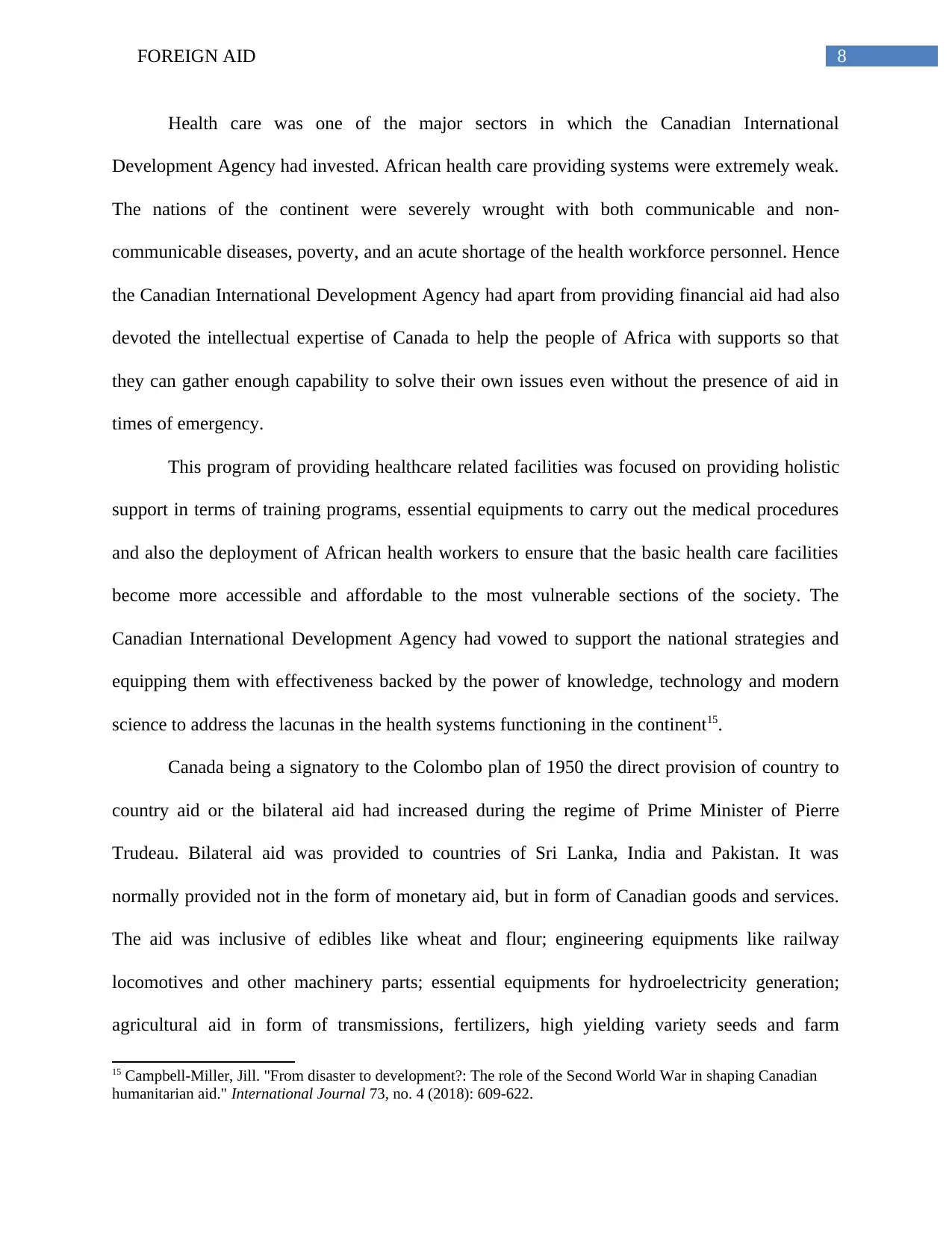
8FOREIGN AID
Health care was one of the major sectors in which the Canadian International
Development Agency had invested. African health care providing systems were extremely weak.
The nations of the continent were severely wrought with both communicable and non-
communicable diseases, poverty, and an acute shortage of the health workforce personnel. Hence
the Canadian International Development Agency had apart from providing financial aid had also
devoted the intellectual expertise of Canada to help the people of Africa with supports so that
they can gather enough capability to solve their own issues even without the presence of aid in
times of emergency.
This program of providing healthcare related facilities was focused on providing holistic
support in terms of training programs, essential equipments to carry out the medical procedures
and also the deployment of African health workers to ensure that the basic health care facilities
become more accessible and affordable to the most vulnerable sections of the society. The
Canadian International Development Agency had vowed to support the national strategies and
equipping them with effectiveness backed by the power of knowledge, technology and modern
science to address the lacunas in the health systems functioning in the continent15.
Canada being a signatory to the Colombo plan of 1950 the direct provision of country to
country aid or the bilateral aid had increased during the regime of Prime Minister of Pierre
Trudeau. Bilateral aid was provided to countries of Sri Lanka, India and Pakistan. It was
normally provided not in the form of monetary aid, but in form of Canadian goods and services.
The aid was inclusive of edibles like wheat and flour; engineering equipments like railway
locomotives and other machinery parts; essential equipments for hydroelectricity generation;
agricultural aid in form of transmissions, fertilizers, high yielding variety seeds and farm
15 Campbell-Miller, Jill. "From disaster to development?: The role of the Second World War in shaping Canadian
humanitarian aid." International Journal 73, no. 4 (2018): 609-622.
Health care was one of the major sectors in which the Canadian International
Development Agency had invested. African health care providing systems were extremely weak.
The nations of the continent were severely wrought with both communicable and non-
communicable diseases, poverty, and an acute shortage of the health workforce personnel. Hence
the Canadian International Development Agency had apart from providing financial aid had also
devoted the intellectual expertise of Canada to help the people of Africa with supports so that
they can gather enough capability to solve their own issues even without the presence of aid in
times of emergency.
This program of providing healthcare related facilities was focused on providing holistic
support in terms of training programs, essential equipments to carry out the medical procedures
and also the deployment of African health workers to ensure that the basic health care facilities
become more accessible and affordable to the most vulnerable sections of the society. The
Canadian International Development Agency had vowed to support the national strategies and
equipping them with effectiveness backed by the power of knowledge, technology and modern
science to address the lacunas in the health systems functioning in the continent15.
Canada being a signatory to the Colombo plan of 1950 the direct provision of country to
country aid or the bilateral aid had increased during the regime of Prime Minister of Pierre
Trudeau. Bilateral aid was provided to countries of Sri Lanka, India and Pakistan. It was
normally provided not in the form of monetary aid, but in form of Canadian goods and services.
The aid was inclusive of edibles like wheat and flour; engineering equipments like railway
locomotives and other machinery parts; essential equipments for hydroelectricity generation;
agricultural aid in form of transmissions, fertilizers, high yielding variety seeds and farm
15 Campbell-Miller, Jill. "From disaster to development?: The role of the Second World War in shaping Canadian
humanitarian aid." International Journal 73, no. 4 (2018): 609-622.
⊘ This is a preview!⊘
Do you want full access?
Subscribe today to unlock all pages.

Trusted by 1+ million students worldwide
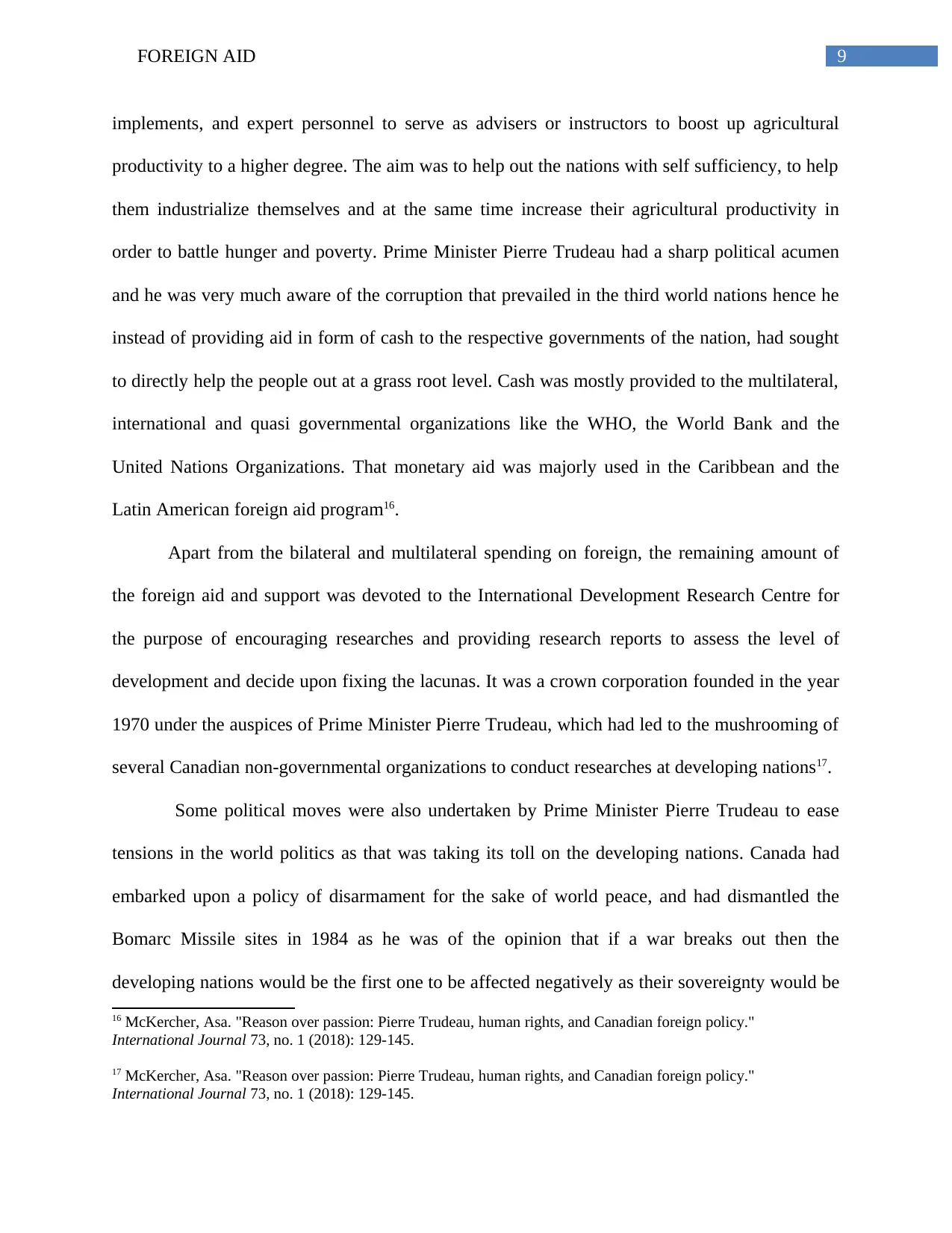
9FOREIGN AID
implements, and expert personnel to serve as advisers or instructors to boost up agricultural
productivity to a higher degree. The aim was to help out the nations with self sufficiency, to help
them industrialize themselves and at the same time increase their agricultural productivity in
order to battle hunger and poverty. Prime Minister Pierre Trudeau had a sharp political acumen
and he was very much aware of the corruption that prevailed in the third world nations hence he
instead of providing aid in form of cash to the respective governments of the nation, had sought
to directly help the people out at a grass root level. Cash was mostly provided to the multilateral,
international and quasi governmental organizations like the WHO, the World Bank and the
United Nations Organizations. That monetary aid was majorly used in the Caribbean and the
Latin American foreign aid program16.
Apart from the bilateral and multilateral spending on foreign, the remaining amount of
the foreign aid and support was devoted to the International Development Research Centre for
the purpose of encouraging researches and providing research reports to assess the level of
development and decide upon fixing the lacunas. It was a crown corporation founded in the year
1970 under the auspices of Prime Minister Pierre Trudeau, which had led to the mushrooming of
several Canadian non-governmental organizations to conduct researches at developing nations17.
Some political moves were also undertaken by Prime Minister Pierre Trudeau to ease
tensions in the world politics as that was taking its toll on the developing nations. Canada had
embarked upon a policy of disarmament for the sake of world peace, and had dismantled the
Bomarc Missile sites in 1984 as he was of the opinion that if a war breaks out then the
developing nations would be the first one to be affected negatively as their sovereignty would be
16 McKercher, Asa. "Reason over passion: Pierre Trudeau, human rights, and Canadian foreign policy."
International Journal 73, no. 1 (2018): 129-145.
17 McKercher, Asa. "Reason over passion: Pierre Trudeau, human rights, and Canadian foreign policy."
International Journal 73, no. 1 (2018): 129-145.
implements, and expert personnel to serve as advisers or instructors to boost up agricultural
productivity to a higher degree. The aim was to help out the nations with self sufficiency, to help
them industrialize themselves and at the same time increase their agricultural productivity in
order to battle hunger and poverty. Prime Minister Pierre Trudeau had a sharp political acumen
and he was very much aware of the corruption that prevailed in the third world nations hence he
instead of providing aid in form of cash to the respective governments of the nation, had sought
to directly help the people out at a grass root level. Cash was mostly provided to the multilateral,
international and quasi governmental organizations like the WHO, the World Bank and the
United Nations Organizations. That monetary aid was majorly used in the Caribbean and the
Latin American foreign aid program16.
Apart from the bilateral and multilateral spending on foreign, the remaining amount of
the foreign aid and support was devoted to the International Development Research Centre for
the purpose of encouraging researches and providing research reports to assess the level of
development and decide upon fixing the lacunas. It was a crown corporation founded in the year
1970 under the auspices of Prime Minister Pierre Trudeau, which had led to the mushrooming of
several Canadian non-governmental organizations to conduct researches at developing nations17.
Some political moves were also undertaken by Prime Minister Pierre Trudeau to ease
tensions in the world politics as that was taking its toll on the developing nations. Canada had
embarked upon a policy of disarmament for the sake of world peace, and had dismantled the
Bomarc Missile sites in 1984 as he was of the opinion that if a war breaks out then the
developing nations would be the first one to be affected negatively as their sovereignty would be
16 McKercher, Asa. "Reason over passion: Pierre Trudeau, human rights, and Canadian foreign policy."
International Journal 73, no. 1 (2018): 129-145.
17 McKercher, Asa. "Reason over passion: Pierre Trudeau, human rights, and Canadian foreign policy."
International Journal 73, no. 1 (2018): 129-145.
Paraphrase This Document
Need a fresh take? Get an instant paraphrase of this document with our AI Paraphraser
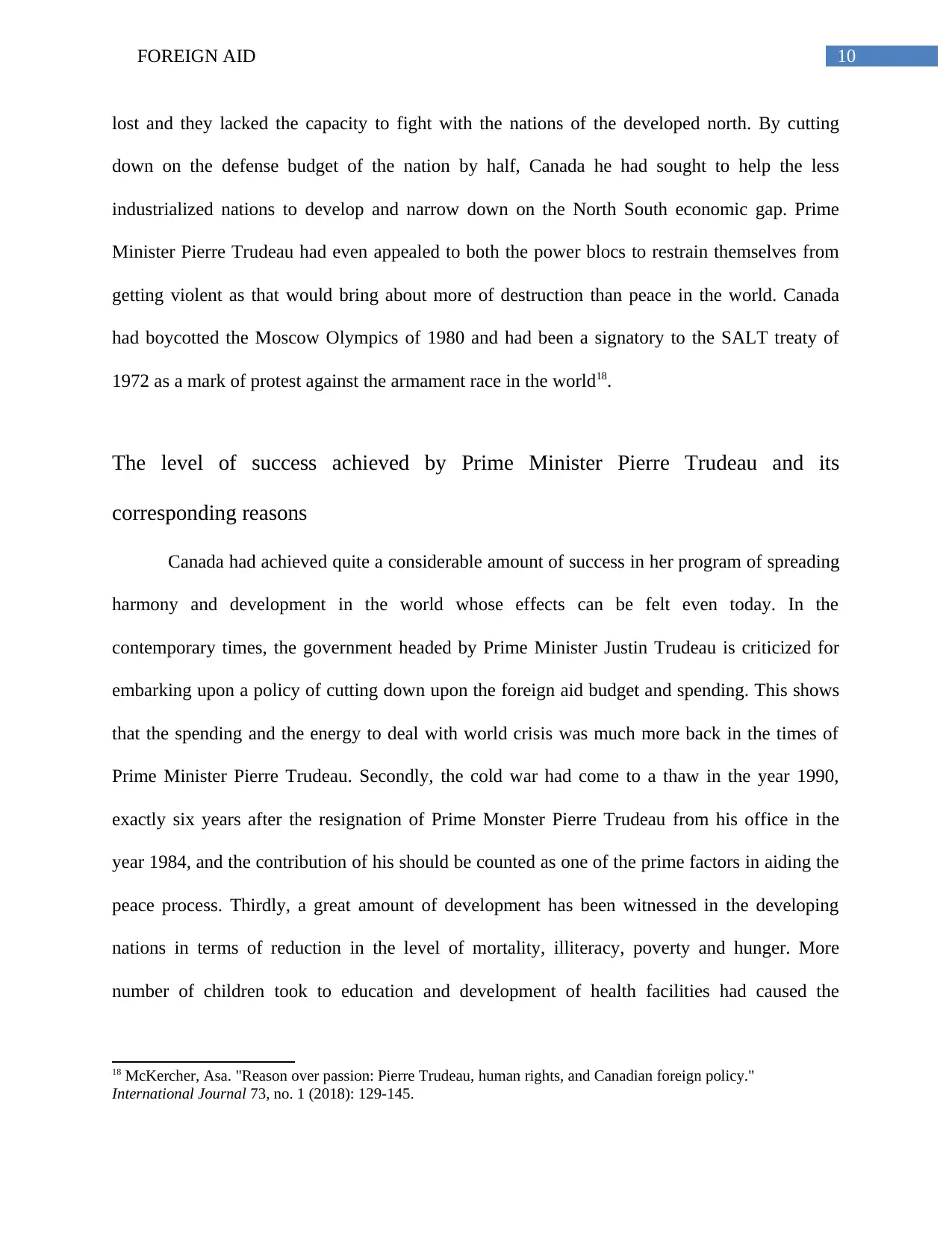
10FOREIGN AID
lost and they lacked the capacity to fight with the nations of the developed north. By cutting
down on the defense budget of the nation by half, Canada he had sought to help the less
industrialized nations to develop and narrow down on the North South economic gap. Prime
Minister Pierre Trudeau had even appealed to both the power blocs to restrain themselves from
getting violent as that would bring about more of destruction than peace in the world. Canada
had boycotted the Moscow Olympics of 1980 and had been a signatory to the SALT treaty of
1972 as a mark of protest against the armament race in the world18.
The level of success achieved by Prime Minister Pierre Trudeau and its
corresponding reasons
Canada had achieved quite a considerable amount of success in her program of spreading
harmony and development in the world whose effects can be felt even today. In the
contemporary times, the government headed by Prime Minister Justin Trudeau is criticized for
embarking upon a policy of cutting down upon the foreign aid budget and spending. This shows
that the spending and the energy to deal with world crisis was much more back in the times of
Prime Minister Pierre Trudeau. Secondly, the cold war had come to a thaw in the year 1990,
exactly six years after the resignation of Prime Monster Pierre Trudeau from his office in the
year 1984, and the contribution of his should be counted as one of the prime factors in aiding the
peace process. Thirdly, a great amount of development has been witnessed in the developing
nations in terms of reduction in the level of mortality, illiteracy, poverty and hunger. More
number of children took to education and development of health facilities had caused the
18 McKercher, Asa. "Reason over passion: Pierre Trudeau, human rights, and Canadian foreign policy."
International Journal 73, no. 1 (2018): 129-145.
lost and they lacked the capacity to fight with the nations of the developed north. By cutting
down on the defense budget of the nation by half, Canada he had sought to help the less
industrialized nations to develop and narrow down on the North South economic gap. Prime
Minister Pierre Trudeau had even appealed to both the power blocs to restrain themselves from
getting violent as that would bring about more of destruction than peace in the world. Canada
had boycotted the Moscow Olympics of 1980 and had been a signatory to the SALT treaty of
1972 as a mark of protest against the armament race in the world18.
The level of success achieved by Prime Minister Pierre Trudeau and its
corresponding reasons
Canada had achieved quite a considerable amount of success in her program of spreading
harmony and development in the world whose effects can be felt even today. In the
contemporary times, the government headed by Prime Minister Justin Trudeau is criticized for
embarking upon a policy of cutting down upon the foreign aid budget and spending. This shows
that the spending and the energy to deal with world crisis was much more back in the times of
Prime Minister Pierre Trudeau. Secondly, the cold war had come to a thaw in the year 1990,
exactly six years after the resignation of Prime Monster Pierre Trudeau from his office in the
year 1984, and the contribution of his should be counted as one of the prime factors in aiding the
peace process. Thirdly, a great amount of development has been witnessed in the developing
nations in terms of reduction in the level of mortality, illiteracy, poverty and hunger. More
number of children took to education and development of health facilities had caused the
18 McKercher, Asa. "Reason over passion: Pierre Trudeau, human rights, and Canadian foreign policy."
International Journal 73, no. 1 (2018): 129-145.
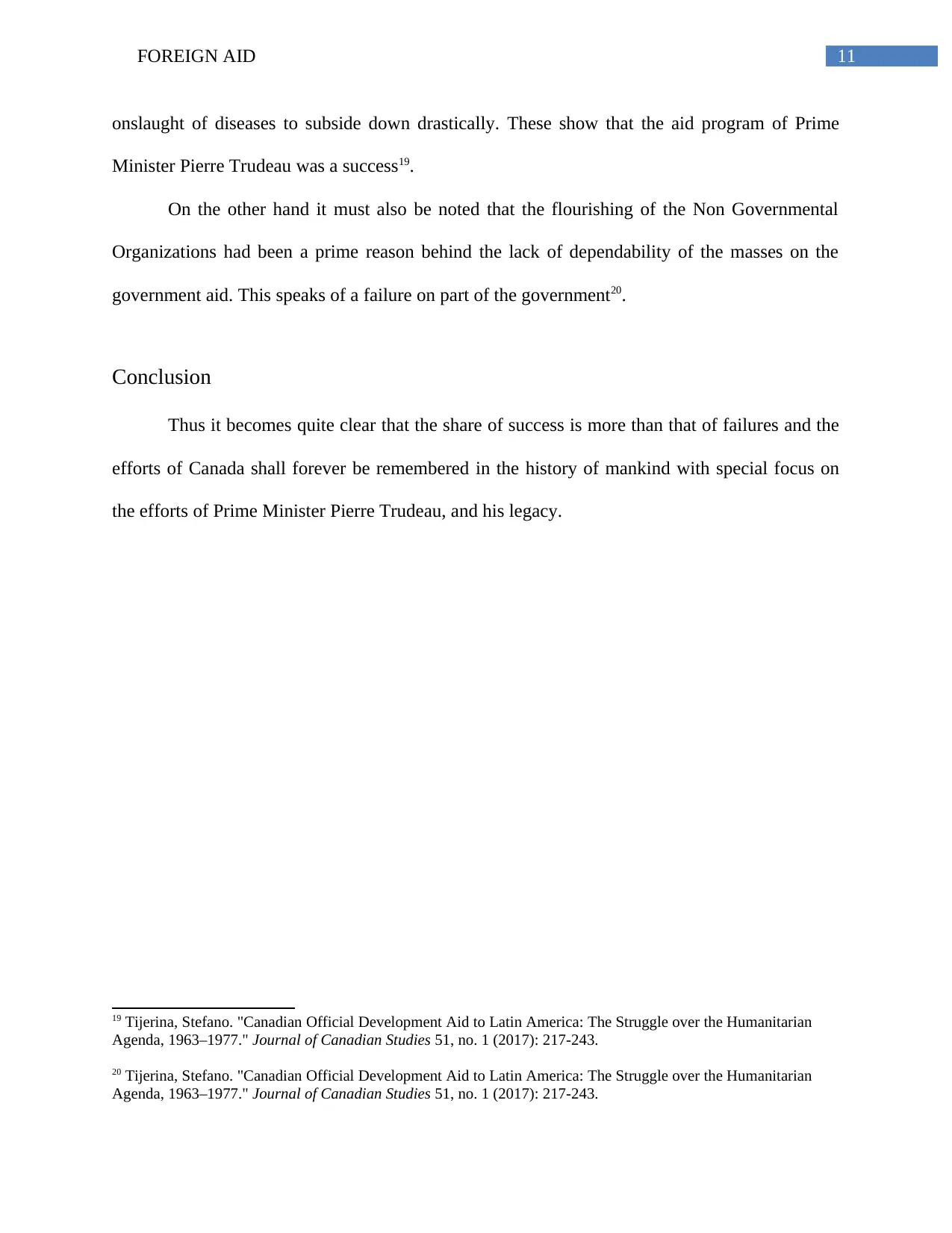
11FOREIGN AID
onslaught of diseases to subside down drastically. These show that the aid program of Prime
Minister Pierre Trudeau was a success19.
On the other hand it must also be noted that the flourishing of the Non Governmental
Organizations had been a prime reason behind the lack of dependability of the masses on the
government aid. This speaks of a failure on part of the government20.
Conclusion
Thus it becomes quite clear that the share of success is more than that of failures and the
efforts of Canada shall forever be remembered in the history of mankind with special focus on
the efforts of Prime Minister Pierre Trudeau, and his legacy.
19 Tijerina, Stefano. "Canadian Official Development Aid to Latin America: The Struggle over the Humanitarian
Agenda, 1963–1977." Journal of Canadian Studies 51, no. 1 (2017): 217-243.
20 Tijerina, Stefano. "Canadian Official Development Aid to Latin America: The Struggle over the Humanitarian
Agenda, 1963–1977." Journal of Canadian Studies 51, no. 1 (2017): 217-243.
onslaught of diseases to subside down drastically. These show that the aid program of Prime
Minister Pierre Trudeau was a success19.
On the other hand it must also be noted that the flourishing of the Non Governmental
Organizations had been a prime reason behind the lack of dependability of the masses on the
government aid. This speaks of a failure on part of the government20.
Conclusion
Thus it becomes quite clear that the share of success is more than that of failures and the
efforts of Canada shall forever be remembered in the history of mankind with special focus on
the efforts of Prime Minister Pierre Trudeau, and his legacy.
19 Tijerina, Stefano. "Canadian Official Development Aid to Latin America: The Struggle over the Humanitarian
Agenda, 1963–1977." Journal of Canadian Studies 51, no. 1 (2017): 217-243.
20 Tijerina, Stefano. "Canadian Official Development Aid to Latin America: The Struggle over the Humanitarian
Agenda, 1963–1977." Journal of Canadian Studies 51, no. 1 (2017): 217-243.
⊘ This is a preview!⊘
Do you want full access?
Subscribe today to unlock all pages.

Trusted by 1+ million students worldwide
1 out of 13
Your All-in-One AI-Powered Toolkit for Academic Success.
+13062052269
info@desklib.com
Available 24*7 on WhatsApp / Email
![[object Object]](/_next/static/media/star-bottom.7253800d.svg)
Unlock your academic potential
Copyright © 2020–2026 A2Z Services. All Rights Reserved. Developed and managed by ZUCOL.
